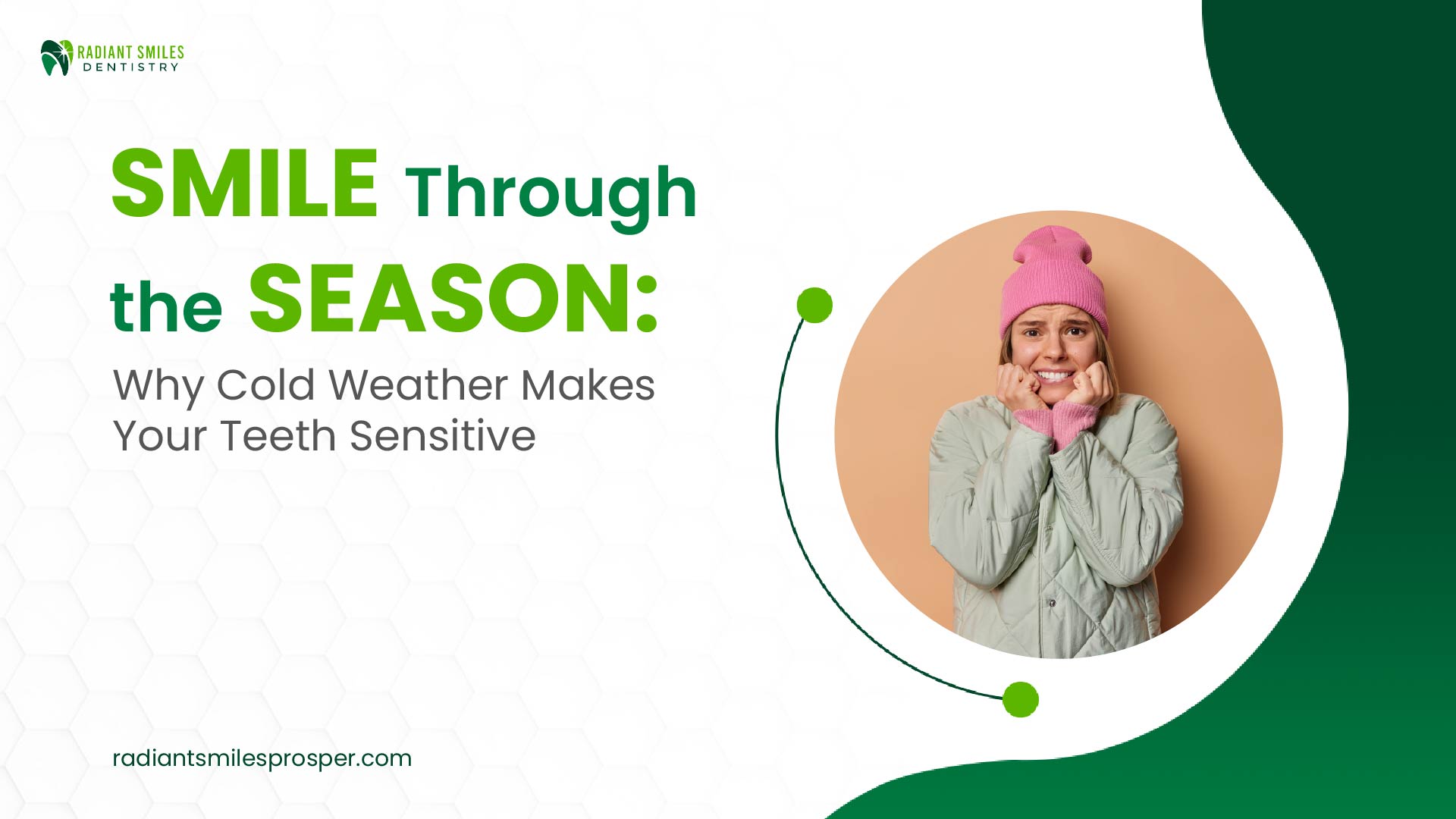What Your Tongue Says About Your Health – A Simple Guide
Have you ever looked in the mirror and noticed that…

Have you ever bundled up for the winter, stepped outside, and felt a sudden, sharp, and painful “zing” in your teeth?
That uncomfortable jolt, the feeling of a chill breeze hitting your teeth, is incredibly common when temperatures drop. It’s what we call cold sensitivity of teeth, and it’s a big reason why many patients visit us here at Radiant Smiles Prosper.
We understand that you want to enjoy the holiday season and the winter without worrying about your sensitive teeth. This guide examines how cold air and specific foods can cause discomfort, identifies common causes, and offers practical solutions. Our team is here to help you feel better and enjoy every meal!
When cold air hits your mouth, the pain you feel isn’t caused by the cold; it’s a warning that your teeth’s protective layers are compromised.
Think of your tooth like a well-insulated house.
Normally, the enamel and your healthy gums cover the dentin completely. But when that dentin gets exposed, those tiny tunnels are open to the cold air.
When cold air or a cold drink touches the exposed dentin, the fluid inside those tunnels shifts rapidly. This sudden movement hits the nerve, and your brain registers it as that lightning-quick, painful “zing.” This is why your front tooth is sensitive to cold and immediately reacts.
Winter makes this worse for two main reasons:
The cold weather is the trigger, but the underlying cause is typically one of these common issues that expose the vulnerable dentin:
1. Enamel Wear
Your enamel is strong, but it can wear down over time due to acidic foods, teeth grinding, or aggressive brushing. When the enamel thins, the dentin underneath is closer to the surface, making your teeth much more reactive to temperature changes.
2. Gum Recession
The root of your tooth doesn’t have a thick enamel coating; it’s protected only by the gum tissue. If you have gum disease, such as gum recession, or have brushed too hard over the years, the gum line can pull back, exposing the sensitive root surface. This is a major cause of winter sensitivity.
3. Cracks, Chips, or Worn Fillings
Sometimes, the sensitivity is localized to just one spot. If you have a hidden crack in a tooth, a chip, or an old, leaky filling, that spot allows cold air to hit the nerve directly. If your teeth hurt from cold only in one area, you need to see us.
Sometimes, the solutions are right in your bathroom or kitchen! Avoiding these habits is the first step in how to relieve tooth sensitivity in winter:
You don’t have to suffer all winter! Here are the best answers to what to do for sensitive teeth right now, simple solutions that put you back in control of your dental health:
While at-home remedies are great for general sensitivity, sometimes the pain is a sign of a deeper issue that needs professional help. This is the ultimate answer to how to treat cold-sensitive teeth.
Don’t ignore pain that is:
If you have these symptoms, the team at Radiant Smiles Prosper can help. We can quickly diagnose the root cause, be it a deep cavity, gum recession, or a hidden crack.
As your trusted source for general dentistry in Prosper, TX, we offer targeted solutions that are proven to provide relief:
Don’t let the fear of a “zing” keep you from enjoying the beautiful winter in Prosper, TX. If you’re struggling to figure out what causes tooth sensitivity to cold, remember, we’re here to help. At Radiant Smiles Prosper, we’re committed to helping you enjoy the season without tooth pain.
(469) 425-8555 today to schedule an appointment and get professional relief!
Look for a toothpaste that explicitly mentions “sensitive teeth” or contains potassium nitrate or stannous fluoride. These ingredients are proven to help block the nerve signals or plug the tiny holes in the dentin.
Yes! The roots of your upper back teeth are very close to your sinuses. When the cold weather causes sinus congestion or inflammation, that pressure can be felt in your upper teeth, leading to a dull ache that feels like cold sensitivity in your teeth.
When only one tooth is sensitive to cold, it’s a strong indicator of a localized problem, such as a new cavity, a chipped filling, or a crack in the tooth. General sensitivity usually affects multiple teeth, so single-tooth pain means it’s crucial to contact your dentist immediately.
Absolutely. This rapid temperature change (thermal shock) puts extreme stress on your teeth. The quick expansion and contraction of the tooth structure can worsen existing cracks and open the dentin tubules, maximizing the painful response to the cold.
Have you ever looked in the mirror and noticed that…
General precautionary measures to improve dental health can have a…
General precautionary measures to improve dental health can have a…